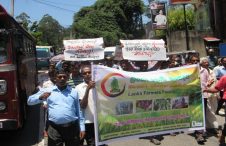
Welimada is a hilly area in the district of Badulla, Uva province, Sri Lanka. Growing upcountry tea and crops is the main livelihood of the 85% of the population in village. The people mainly cultivate potatoes, beans, cabbages, carrots, leeks, and beetroots.
Potatoes are the most suitable crop in the area because of the climate. The government used to offer subsidies to protect and encourage the farmers, but the support has waned. Many of the farmers faced critical situations and had to give up faming because of unjustified prices of vegetables in the market.
The Welimada farmers use 800 to 1,000 kilograms of potato seeds for a one acre of land and from this, they ae able to harvest approximately 9,600 to 12,000 kilograms of potatoes. During harvest season, the price of potato goes down to LKR 60 (USD .34) per kilogram. Intermediary sellers buy the potatoes from the farmers in very low rates so they can generate high profits. This cycle leaves the potato farmers in incessant poverty. Other factors at play include government importation of potatoes, increasing production expenses, less manpower, and various diseases affecting the crops.
The Badulla District farmers gathered and worked with Lanka Farmers’ Forum (LFF). After considering the matters affecting the farmers of Welimada, they gave suggestions for obtaining certain minimum price for the potatoes to protect the farmers. Discussions with the government were organized, but they were unable to give a solution. Using strength of the LFF committees, a campaign against the government was organized, which was participated by Welimada United Farmers’ Sssociation. The government tried to stop the campaign, but the farmers did not stop and were successful at the end of the day.
Through the MTCP2 Program, LFF initiated the campaign and successfully obtained the following:
- Organized the farmers so they can protect their own rights and win their interests
- Informed the farmers on the advantages of campaigns, conferences, and organizations
- Initiated actions to get the government to provide solutions to the farmers’ problems
- Achieved a minimum price of LKR 92.50 (USD .52) per kilogram of potatoes
- Provided training for the farmers on environmental-friendly methods of farming
- Helped improved the living conditions of the farmers by increasing their income
About MTCP2
The Medium Term Cooperation Program Phase 2 (MTCP2), a five-year capacity building program supported by the International Fund for Agricultural Development (IFAD), the Swiss Agency for Development and Cooperation (SDC), and the European Union (EU), has been implemented in 19 countries across three sub-regions—Southeast Asia, South Asia, and the Pacific—engaging 1,544 sub-national farmers organizations (FOs) with a total membership of around 22 million farmers.
The funding support (total budget of $ 5 million for the whole duration of the project across 19 countries) serves as a catalytic fund that will allow FOs to enhance their capacity to be effective channels of economic services to farmers.
So far, the program has contributed to the formation of strong national platform of FOs with improved capacity to engage in policy processes and mobilize resources from mainstream agricultural development programs like extension services, credit, and pre and post harvest facilities. The program also helped in transforming farmers associations into commodity-based cooperatives to strengthen the role of small-scale farmers within an inclusive and sustainable value-chain.
The program is being implemented by the consortium Asian Farmers’ Association for Sustainable Rural Development (AFA) and La Via Campesina (LVC).



Comments are closed